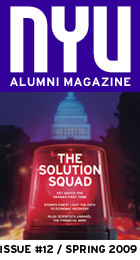writers workshop
The Art of War
Veterans find storytelling
offers catharsis and community
by Anna Weinberg
On the bitterly cold Saturday before Thanksgiving, five veterans gather on West 10th Street in New York to give thanks. “Thanks for the tree / between me & a sniper’s bullet,” reads Roy Scranton, a soft-spoken, 32-year-old Army veteran. “Thanks for deflecting the ricochet / against that anarchy of dusk.”
The poem is by the Vietnam vet Yusef Komunyakaa, a Pulitzer Prize winner and distinguished senior poet in the NYU Creative Writing Program, and the men are veterans of the first and second Gulf Wars who have come together for a workshop organized by the program. The group, which meets once a week for two hours, encourages veterans to bear witness through fiction, essays, and poetry to their own stories of combat and homecoming. While the 18 men and women have varying degrees of comfort with writing, and wildly different wartime experiences, they manage to find some common, safe ground each week in the calm cream-and-slate confines of the program’s Lillian Vernon Creative Writers House. Like other veterans before them—Hemingway, Heller, Vonnegut—many use their writing to communicate who or what was taken or gained through their service. “I lost two friends while over there and I feel I would be wasting myself if I didn’t try to do something that educated people on them,” says Jerry Della Salla (TSOA ’92), a 39-year-old actor who enlisted after 9/11 and served as an MP at Abu Ghraib prison from 2004-05.
This November morning, Laren McClung (GSAS ’09), a warm and thoughtful second-year MFA student who leads the group, asks everyone to reflect on the seasonal themes of gratitude and food through poems by Komunyakaa and Langston Hughes. “Let it rise from your own voice into the poem,” she tells them, marking out 15 minutes to write. “Don’t worry about forcing the music.” With photographs of Philip Roth, Susan Sontag, and Gwendolyn Brooks gazing down upon them, the men settle into stillness and begin.
“They produce some of the most beautiful writing, really powerful, really horrifying at times,” says McClung, whose father was a Vietnam War draftee and who is currently working on an anthology of writing by the children of Vietnam veterans. “But they’ve all been able to kind of go into themselves and pull out the stories.” When a writer runs into difficulty, McClung simply encourages them to write “whatever comes to mind,” she says. “I tell them not to worry about straying from the assignment, but to just write. And if they want, I encourage them to talk out a memory or an idea until they say something that triggers writing.”
While topics range from a sailor’s love of the sea to the perennial fallback of writer’s block, the singular experience of war presents its own complications and urgency for the workshop. Fewer than 2 percent of Americans serve in the military, and this is a part of what the writers consider each Saturday. “[War] changes you on so many levels—you don’t feel the same, you don’t look at things the same way,” says Alexander Misiewicz, 49, a gruff Army captain who composes a prayerful poem about a promise he made to his wife. “It’s very lonely because there are so few. Even though everybody’s experience is different, there are things that connect us.”
This connection makes it easier to share the intense stories that occasionally spill forth. “Trying to take a lot of this stuff into a [regular] writing group is weird because no one else can relate to it,” says Scranton, who’s completing a joint BA and MA in liberal arts/liberal studies at the New School, and was stationed in Germany, Iraq, and Oklahoma during his four-year tenure with the Army. “It’s like they can’t even talk about the writing because it’s a freak show, whereas coming here, we’re all freaks together.”
Komunyakaa, the poet, says he once thought he would never write about his time in Vietnam but that the need to express one’s self through written words is natural, regardless of the experience that creates it. “A soldier is no different than any other human being,” says Komunyakaa, who served as an information specialist and then as an editor with the Army’s Southern Cross newspaper in 1969, and who, along with other guest writers, is leading workshops this spring. “He or she possesses attributes of a complex organism, the innate capacity to respond to stimuli. But each of us also possesses the capacity of reflection and compassion. Maybe poetry is a path.”
When the 15 minutes are over and it’s time to share the day’s endeavors, Scranton offers up his poem of thanks for his own survival. “My amazement at being alive / when I remember / remember / a bullet / a truck / a night / a mistake / glows so hard,” he reads, “I can’t even say thanks.”

“Trying to take a lot of this
stuff into a regular writing group is weird because no one else
can relate to it,” Iraq war veteran Roy Scranton says.







